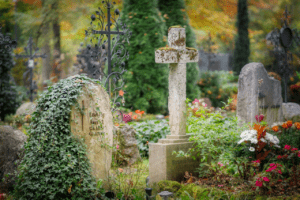Reflection for the First Sunday of Lent C
Readings: Deuteronomy 26: 4-10 (RM) or 1-11 (RCL); Psalm 91; Romans 10: 8-13;
Luke 4: 1-13.
It was a much-anticipated Sunday evening, the broadcast of the last-ever television episode of “Downton Abbey.” In countless homes across North America viewers sat rapt before their screens to see what would take place to bring a happy ending to the stories of their familiar, favourite characters.
That’s when the province of Ontario first used its new Amber Alert system.
In an instant, a hideously loud, braying noise ripped from the set and shattered the room. A garish orange flashing crawler invaded the screen. My heart stopped and my blood ran ice cold. I was paralyzed with sudden terror in my own living room.
Granted, the Amber Alert was designed to jolt viewers and grab their attention. Me, it triggered. I was instantly terrified, heart pounding, blood pressure up.
And the trigger, I recognized later, was caused by having grown up in the U.S. during the Cold War in the 1950’s and’60’s. School drills and family bomb shelter preparations were part of everyday life. When the radio or TV interrupted its program with
“This is a test of the Emergency Broadcast System,”
a sharp pulsating, braying alarm sounded, and a frightening crawler ran across the screen. As a child I knew, I knew, that this meant that the Russians were coming in warplanes to drop nuclear bombs on everyone and we would all die horribly.
Jump ahead to 2025, on the south side of the U.S./Canadian border. Suddenly, this past Tuesday evening, the same abrupt screeching from the TV, the same ugly orange banner, a stern announcement, “This is only a test.” The same shock.
It was right before the start of the State of the Union message to the U.S. American people. Coincidence? …or karma? Are the Russians here yet?
Sometimes the test can be nearly as terrifying as the anticipated emergency itself.
Sometimes, not.
Our Gospel reading speaks of Jesus being “put to the test.” Granted, there’s a shift of meaning in the idea of a “test.” Testing in anticipation of an emergency – a potential tragedy – is different from a “test” intended to provoke one: a staged test, a form of subtle bullying, an ambush if you will. In the Gospel, this story served as a precursor to the manipulative testing to which Jesus would later be subjected by opponents seeking to probe and find his weaknesses.
The name of the bully here, Satan, meant “accuser” or “prosecutor” in Hebrew, but when the Hebrew Bible was translated into Greek it became diabolos, the devil. More precisely, the slanderer. In 2 Corinthians 4:4, he is the one who
“has blinded the minds of the unbelievers, to keep them from seeing the light of the Gospel of the glory of Christ, who is the image of God.”
In Colossians 1:13 he is “the power of darkness.” And in John 8:44, “he is a liar and the father of lies.”
If we hadn’t seen enough blatant lies play out on the world stage in the past few years, we’re seeing even more explicit, deadly lies right now. I’m thinking back to a film clip shown on the BBC at the start of the invasion of Ukraine, of an elderly Russian lady in front of her TV set. The interviewer asked her about the Russian forces targeting residential areas and civilians in Ukraine. She looked up and responded placidly,
“But they won’t do that. They promised they would not. And they will keep their promise.”
Sometimes you can’t see the truth until you’re ready to see it, maybe until you’ve grown strong enough to see it. Maybe after the confusion and fear has left you. Anyone who has been gaslighted in a toxic relationship, or been manipulated by lies until reality becomes blurred, has been there. Anyone who has struggled to believe something they really want or need to believe, has been there.
Jesus was there too. Over and over. Our story shows that, filled with the Holy Spirit, he was able to summon the insight to pierce the fabric of lies, and to call forth the strength not to succumb.
And the devil left him.
© Susan K. Roll
This is an updated version of the Reflection for the First Sunday in Lent 2022.
Susan Roll retired from the Faculty of Theology at Saint Paul University, Ottawa, in 2018, where she served as Director of the Sophia Research Centre. Her research and publications are centred in the fields of liturgy, sacraments, and feminist theology. She holds a Ph.D. from the Catholic University of Leuven (Louvain), Belgium, and has been involved with international academic societies in liturgy and theology, as well as university chaplaincy, Indigenous ministry and church reform projects.





Very pertinent reflection. So insightful and definitely applicable to the present times.